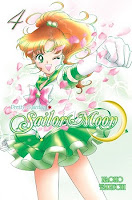Sailor Moon Vol. 4 continues the trend of upping the stakes begun in the last volume. With two of the Sailor Senshi kidnapped by their enemies the Black Moon, the strain on Sailor Moon (Usagi Tsukino) and the remaining senshi begins to weigh heavily on them. In the previous Dark Kingdom arc Usagi spent most of the time mooning over (pun not intended) Mamoru Chiba when he was kidnapped by Queen Beryl. But her concern here for her missing comrades' safety is felt even by friends who remain unaware of her double-life as the incarnated princess of a lost kingdom. There's a real vulnerability to Usagi that was absent in earlier volumes that tended to emphasize her "cute" shortcomings, such as her clumsiness and laziness. And even Sailor Jupiter (Makoto Kino) is treated to some brief character development that goes beyond her identity as the team's "big girl" before quickly becoming the story's next kidnap victim.
A lot of the unease is due to Usagi's antagonistic relationship with Chibi-Usa. She's the only person who openly distrusts the mysterious child's true motives, and doesn't understand why the others on the team are more willing to indulge her oddball behavior (I'm a little confused about that myself). When Chibi-Usa's latest escapade almost results in disaster for everyone, Usagi lets her have it. After all, the team's down to half-strength, the missing members could be dead for all she knows, and here's this obnoxious brat stealing her magical items and running around half-cocked. This also leads to Usagi and Mamoru's first lovers spat. Usagi resents Mamoru's affectionate interactions with Chibi-Usa. I know. Being jealous of a prepubescent girl isn't Usagi's finest moment. Late in the volume this almost gets her killed. And when Chibi-Usa reveals who she really is, the whole thing between the three acquires an even more twisted meaning. But so far, this pettiness is the most relatable emotion to come out of the series. Usagi and Mamoru do get to make up afterwards, only for creator Naoko Takeuchi to become more coy than a film director working under the Hays Code. So you'll have to decide for yourself whether they consummated their romance or not.
The big reveal of this volume (Spoiler Alert) is that Chibi-Usa and the Black Moon are from the future, where everything was fine until the Black Moon decided to take over the world and invade the past. So everyone gets to travel to the future and meet a new senshi, Sailor Pluto. What can I say. It wasn't that long ago when Pluto was stripped of its planet label. Whatever. For the needs of this series, Sailor Pluto is the guardian of the underworld (patterned after her mythical namesake) and this apparently makes her the guardian of time as well. So I guess we'll be seeing more for her. The whole time travel trope generates a new wrinkle on the series love vs. fate theme. Before, Usagi and Mamoru worried about repeating the past. Now they worry about whether the future is written in stone. Actually their future selves turn out alright. But the future in general is another thing altogether.
You know how you're supposed to believe that Bedford Falls is a hunky-dory place, while Pottersville is its undesirable doppleganger, but deep in your heart you find the former to be utterly drab and would prefer to hang out at the nightclubs of the latter? Future Tokyo is even more uninteresting than that sleepy American town, resembling Krypton from Richard Donner's Superman. It's an advanced, stable society where everyone is near-immortal. It's meant to be seen as a utopia. But it feels sterile. This future is seen mainly through the eyes of Chibi-Usa, who turns out to be a princess. She should be happy. It's apparent that she's a spoiled child. But she's downright miserable, subverting the classic princess fantasy. Living in the shadow of her charismatic mother. Not exhibiting any of the supernatural abilities that are her royal birthright and being teased mercilessly for it. And worse of all, stunted in her physical growth so that she has inexplicably remained a little girl for nine hundred years. Her existence sounds like a child's worst nightmare. And this revelation transforms her from a very unlikeable character into a truly pitiable figure. Why hasn't she joined the Black Moon and tried to overthrow the status quo?
Here's one explanation: The rebel leader Prince Demande is a creep. Aside from the mass murder he carries out in both the present and the future, he constantly threatens Chibi-Usa's life, forces himself on a helpless Usagi, and calls himself "prince" like it actually means something. His villainous grandstanding makes the previous wannabe-royal Queen Beryl look like a decent human being. Whatever moral ambiguity that could arise in other parts of the book is replaced by the simple desire to see someone kick this guy's ass. Unfortunately, that will have to take place in future volumes.

